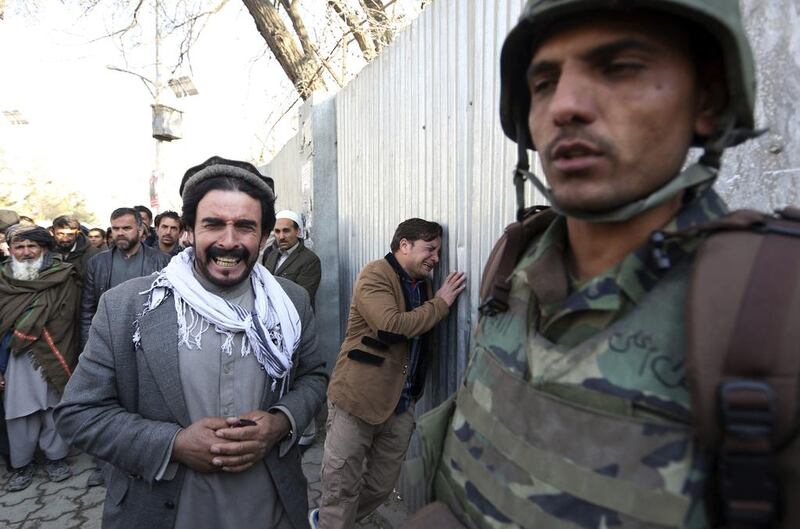KABUL // ISIL gunmen dressed as doctors stormed a hospital in the Afghan capital on Wednesday and slaughtered at least 38 people in a bloody gun and bomb rampage lasting six hours.
More than 50 people were wounded in the attack on the Sardar Daud Khan military hospital, which was claimed by ISIL.
Medical staff trapped inside the hospital by the gunmen posted desperate appeals for help on social media.
“Attackers are inside the hospital. Pray for us,” a staff member wrote on Facebook.
The attack on the 400-bed military hospital, the largest in Afghanistan, began at about 9am when a suicide bomber walked up to the back entrance and blew himself up.
Three men wearing white lab coats brandishing AK-47s and grenades stormed inside, spraying gunfire.
Adul Qadir, a nurse who was badly wounded, saw one of his friends gunned down on the third floor.
“I was changing my clothes, getting ready to start work when the firing began,” Mr Qadir said. “At first I thought it was my friend knocking on the door. When I looked I saw the suicide bomber in a white doctor’s coat and he shot at me. I fell and rolled myself down the stairs.
“Then he shot my friend, a cleaner. I was stuck there but eventually I managed to escape over the barbed wire at the back of the building.”
Ghulam Azrat said he escaped through a fourth-floor window after the attackers killed two of his friends.
Majid Mojib, in charge of the hospital’s intensive care unit, broke a leg as he plunged from a third-floor window.
“I saw in horror that doctors, patients, everybody was screaming as they were chased by gunmen spraying bullets indiscriminately,” he said. “Many did not survive. It was a massacre.”
Patient Zia Zabuli and others barricaded themselves in a room when they saw a gunman approaching. “We put beds, chairs and whatever there was behind the door,” he said.
From their hiding place, they heard gunfire and of explosions from hand grenades. At one point, one of the terrorists tried to break into the room.
“He came up to our door and kicked it several times but it did not open. Then he left,” said Mr Zabuli, who was still in his pyjamas as he limped away from the scene supported by a relative.
“We stayed quiet and prayed for our safety.”
The attack set off a six-hour firefight as Afghan special forces surrounded the building and battled the killers floor by floor.
There were at least two more explosions, including a vehicle bomb in the car park, as a helicopter carrying Afghan troops landed on the hospital roof.
Four hours after the explosion that started the attack, defence ministry spokesman Gen Dawlat Waziri said the commandos had killed one of the attackers and were pursuing two others who were still at large on the sixth and seventh floors.
One member of the security forces was also dead and three wounded, Gen Waziri said. All patients at the hospital had been moved out.
Many roads in Kabul were already blocked that day because of a commemoration event for a deceased warlord. As Afghan special forces launched the clean-up operation, Kabul’s diplomatic district came to a standstill.
The victims of the deadly attack were nearly all hospital patients, doctors and nurses, said Gen Waziri.
As news spread of the attack, relatives of the victims gathered outside the hospital, anxious, tearful and angry at security officials for failing to stop the terrorists.
“My brother, an Afghan soldier, was wounded in the battlefield but got killed in this military hospital,” one man shouted. “He was killed in a place where he should have been treated and protected.”
A man named Jawed said his sister, a doctor at the hospital for more than five years, had phoned him saying the hospital was under attack but she was stuck inside.
“All our family is worried. The police have blocked all the ways in and they can’t get anyone out,” Jawed said.
Another man said he had a call from his brother, who was taking care of their wounded father when the attack began.
“He told us that he was carrying our father on his back,” he said. “Now my uncle who is inside the hospital has just called and told us both were martyred. He said their bodies were next to each other.”
ISIL claimed the attack in a statement carried by Aamaq, its affiliated news agency, and through a verified telegram account.
The Taliban, the largest, most powerful and well-established extremist group in Afghanistan, denied all responsibility. The attack came just a week after 16 people died in simultaneous suicide bombings by the Taliban on two security compounds in Kabul.
Afghanistan’s warring parties, including government forces, have repeatedly targeted medical centres, undermining the country’s fragile health system.
The Taliban are known to distance themselves from attacks on medical centres and those that result in high civilian casualties, and have clashed with ISIL and its affiliates in recent years.
Afghan president Ashraf Ghani condemned the assault as “an attack on all Afghan people and all Afghan women”, during an address in honour of International Women’s Day.
Afghan chief executive Abdullah Abdullah said attacking a hospital was unjustifiable. “This is a criminal act. We will never forgive these criminals.”
The carnage underscores rising insecurity in Afghanistan. The country is bracing for an intense fighting season in the spring as the government’s repeated bids to launch peace negotiations with the Taliban have failed.
Afghan forces, already beset by record casualties, desertions and “ghost soldiers” on the payroll, have been struggling to beat back insurgents since US-led Nato troops ended their combat mission there in December 2014.
* Additional reporting by Associated Press and Agence France-Presse





